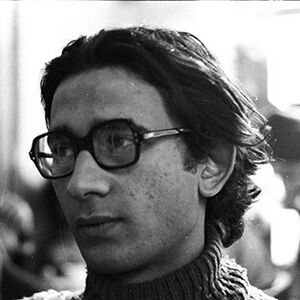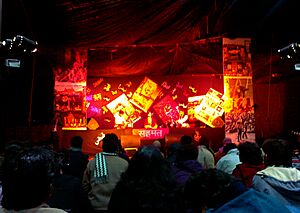Safdar Hashmi facts for kids
Quick facts for kids
Safdar Hashmi
|
|
|---|---|
 |
|
| Born | 12 April 1954 Delhi, India |
| Died | 2 January 1989 (aged 34) Ghaziabad, Uttar Pradesh, India |
| Occupation | Author, Street theatre, Activist |
| Period | 1973–1989 |
| Spouse | Moloyshree Hashmi |
| Relatives |
|
Safdar Hashmi (born April 12, 1954 – died January 2, 1989) was a famous playwright and director from India. He was best known for his amazing work with street theatre. This is a type of theatre performed outdoors in public places, often to share important messages.
Safdar Hashmi was also an actor, a writer of songs, and a thinker about theatre. Many people still see him as a very important voice in Indian political theatre. He was an activist with the Students' Federation of India (SFI), a student group. In 1973, he helped start Jana Natya Manch (which means People's Theatre Front), often called JANAM. Sadly, he was killed in 1989 while performing a street play called Halla Bol.
Contents
Safdar Hashmi's Early Life
Safdar Hashmi was born in Delhi, India, on April 12, 1954. His parents were Haneef and Qamar Azad Hashmi. He spent his early years in Delhi and Aligarh. He grew up in a very open-minded family. He finished his schooling in Delhi. The actress Saba Azad is his niece.
Hashmi studied English Literature at St. Stephen's College, Delhi. He then earned his master's degree in English from Delhi University. During these years, he became involved with the cultural group of the Students' Federation of India. This group was linked to the Communist Party of India (Marxist). He also joined the Indian People's Theatre Association (IPTA). Before and after college, he worked on plays with IPTA, like Kimlesh and Dekhte Lena.
His Career and Activism in Theatre
Safdar Hashmi helped create Jana Natya Manch (JANAM) in 1973. JANAM grew from the Indian People's Theatre Association (IPTA). It was connected to the Communist Party of India (Marxist), a political party he was very active with in the 1970s.
Using Theatre for Social Messages
When Indian Prime Minister Indira Gandhi faced accusations about elections, Hashmi wrote a street play. It was called Kursi, Kursi, Kursi (Chair, Chair, Chair). The play was about a king whose throne would not let him give it up for an elected leader. This play was performed every day for a week in New Delhi. It became a very important moment for JANAM.
Until 1975, JANAM performed plays outdoors for large crowds. But then, Indira Gandhi declared a state of emergency. This made it hard to perform political theatre. So, Hashmi started working as a teacher of English literature at universities. He taught in Garhwal, Kashmir, and Delhi.
Returning to Street Theatre
When the Emergency ended in 1977, Hashmi returned to his activism. In 1978, JANAM started doing a lot of street theatre. Their play Machine was performed for a huge meeting of over 200,000 workers. After that, they created plays about many social issues. These included plays about farmers' problems (Gaon Se Shahar Tak), violence against women (Aurat), and rising prices (DTC ki Dhandhli).
Hashmi also made several documentaries and a TV show for Doordarshan, India's public broadcaster. One show, Khilti Kaliyan (Flowers in Bloom), looked at how people in villages could gain more power. He also wrote books for children and articles about Indian theatre.
Hashmi was the main director of JANAM. Before his death, the group performed about 4,000 shows of 24 street plays. Most of these were in working-class areas, factories, and workshops. He was a member of the Communist Party of India (Marxist).
His Personal Life and Full-Time Activism
In 1979, he married Moloyshree, who was also a theatre actress and a fellow activist. Later, he worked as a journalist for the Press Trust of India (PTI) and The Economic Times. He also worked for the Government of West Bengal in Delhi. In 1984, he left his job to work full-time on his political activism and theatre.
Hashmi wrote two stage plays. He also wrote many songs, a TV series script, poems, and plays for children. He made documentary films too. He was dedicated to creating art that was radical and popular. He always tried new things in his plays and avoided old, tired ideas.
Safdar Hashmi's Death
On January 1, 1989, the JANAM group started performing their street play Halla Bol (meaning Raise Your Voice!). They were performing during local elections in Jhandapur village, near Delhi. During the play, the group was attacked by some people. Safdar Hashmi was badly hurt and died the next day.
Two days after his death, on January 4, 1989, his wife Moloyshree Hashmi went back to the same spot. With the JANAM group, she bravely finished the play. Years later, a court found ten people guilty of his murder.
His Lasting Impact and Legacy
Safdar Hashmi has become a symbol of standing up against unfair power for many people in India. JANAM continues its theatre work today. On April 12, 2012, which was Hashmi's birthday, the group opened Studio Safdar. This is a special place for performances and workshops in Delhi. It is next to a cafe and bookstore called May Day.
In February 1989, the writer Bhisham Sahni and many other artists started the Safdar Hashmi Memorial Trust (SAHMAT). This group is a platform for artists who care about politics and society. Hashmi's writings were later collected in a book called The Right to Perform: Selected Writings of Safdar Hashmi.
Every year on January 1, SAHMAT observes Safdar Hashmi Memorial Day as a "Day of Resolve." They organize a day-long cultural event called "Jashn-e-Daura" in New Delhi. JANAM also remembers the day by performing street plays in Jhandapur village, where he was killed.
In 1998, the Safdar Hashmi Natyasangham was formed in Kozhikode, Kerala. This group gives free theatre training to students who are not well-off financially.
Two films were inspired by his life: Anbe Sivam (2003) and Halla Bol (2008). The film Halla Bol shows a scene where a street theatre activist is beaten by people hired by a political party. This event then leads to a public uprising.
In 1989, the famous painter M.F. Husain created a painting called "Tribute to Hashmi." It was sold at an auction for over $1 million. This was the first time a painting by an Indian artist reached such a high price.
A book published in 2020, Halla Bol: The Death and Life of Safdar Hashmi by Sudhanva Deshpande, tells the story of the attack on JANAM's play. It also talks about Safdar's important work.
The Institute for Research and Documentation in Social Sciences (IRDS) gives out the Safdar Hashmi Award for Human Rights. This award honors his contributions to human rights. A street in Mandi House, New Delhi, was also named after Safdar Hashmi.


